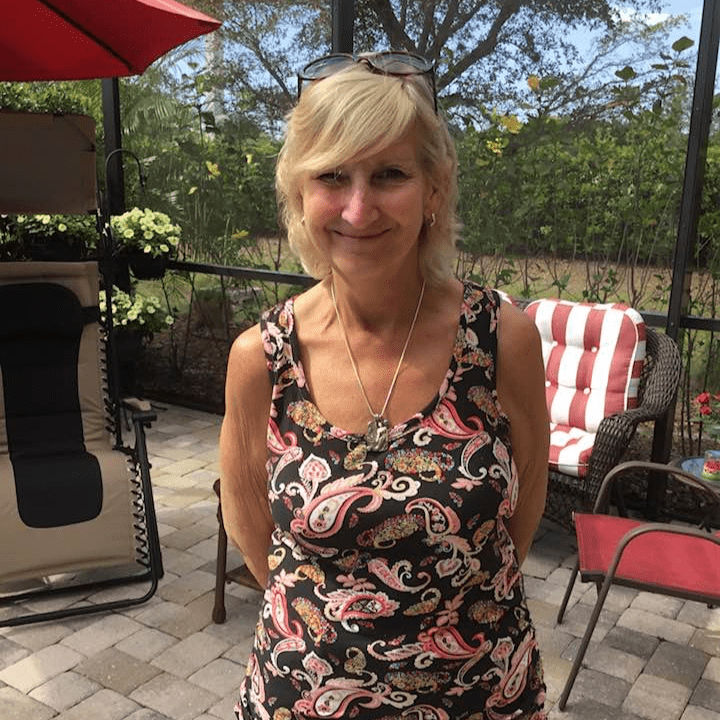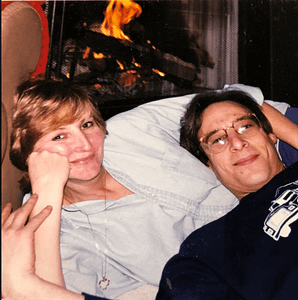
Judy shared her story in January of 2021.
I hope you never have to see your loved one suffer the way my husband did at the end of his life. He endured months of severe pain and begged to be able to die peacefully. I still have nightmares about his suffering and not being able to do anything to help.

Judy Rene with her husband Rick Hirsh
In April 2018, my husband of 38 years Rick Hirsh sought medical attention after experiencing difficulty breathing. After an x-ray revealed a spot at the bottom of one of Rick’s lungs, the ER doctor ordered another x-ray and follow up tests. A month later we got a diagnosis: Stage 4 lung cancer and severe emphysema.
We knew with Rick being a smoker that he likely had emphysema, but it never dawned on him that he could have cancer. No one in his family had ever been diagnosed with cancer. The news was devastating and the doctor’s flippant delivery of the information via phone call was just as heartbreaking, “Well, you’ll be dead in a year. It’s stage 4 lung cancer.” We were in shock.
They couldn’t do anything to help him. A highly regarded cancer facility, however, offered that Rick could do an immunology therapy trial that would not help him but the research could help others in the future. Friends advised that Rick skip all treatment and just enjoy the time he had left. Against their advice, Rick opted in and started in July. In the meantime, we got our wills and affairs in order.
Shortly after starting the trial, Rick started feeling worse. He hadn’t expected the trial to help him, but he certainly had not expected it to exacerbate the situation. He continued to lose significant weight, which he had already been losing before being diagnosed. His pain increased and by the beginning of November he was so sick that he decided to drop out. He was spending hours in the bathroom in agony and he was having a hard time getting out of bed.
Many years before his diagnosis, we had talked about wanting to avoid the painful prolonging of life at its end. My mother, who was an RN and WWII veteran, had a major stroke and had told us all that she did not want to be put on a ventilator, “I do not want to be kept alive.” Since then, we had talked as a family about the measures we hoped to avoid in our last days.
Rick made it clear that he maintained the same wishes as we had discussed previously. We started talking about moving to Oregon to access their Death with Dignity law but he was already too sick to travel. We couldn’t even travel for leisure to create some last joyful memories of vacations together. The trial just wrecked his body, even though on paper it looked like it should have helped. Rick told the trial doctor who was enthused by the results, “Great. The tumor shrunk, but I’m not going to get better and I feel horrible.”
In the months leading up to the new year, whenever Rick went to the hospital for treatment, he would ask them if they could give him something so he wouldn’t have to suffer. Rick would ask, “Why are they making me suffer so much?” He would plead, “Can’t you just shut the light off? Just don’t let me come out of this.”
In January, as Rick inched toward the year anniversary of his diagnosis, it became evident that he was nearing the end. I stopped working and we called hospice. Even with their help, he suffered so much. Hospice came in once a week and left morphine for me to dose Rick. He begged me to overdose him. He wanted so badly to be released from his suffering. I knew if something happened, it needed to be in my higher power’s hands. I couldn’t be the one to cause his death.
Rick should have been allowed the autonomy in deciding if he would utilize medical aid in dying. To see your loved one suffer when there are options in other states is both devastating and enraging. He knew he wanted the option. If he had been well enough to endure the move, we would have relocated to another state to access it. It was hard enough for Rick to endure the car rides to treatment.
Instead, I watched the love of my life suffer with escalating pain and distressing symptoms.
His last two months of life were absolutely horrible. Hours on end suffering. Severe, agonizing pain. He suffered with bed sores. It was hard for me to hug him because his whole body just ached. He couldn’t eat. He had no appetite and lost over 40 pounds. Six foot tall and only 122 pounds.
All Rick wanted was to not hurt, but that’s all he did. Constant pain. He was always in control, so the lack of control was extremely difficult for him. Then when his mind left in the last two weeks of his life, it was another layer of agony for him and for our family.
He spent a few days in-patient for hospice to tweak his medications to try to gain some control over his symptoms. We brought him home on Monday, but by Thursday he was having a real hard time breathing. Hospice sent in a large oxygen machine and a respiratory therapist.
His mind was far gone at that point and he feared they were trying to prolong his life against his will. As soon as they left, he ripped off his oxygen mask and would not let me put it back on him. He didn’t realize his death was so imminent. With his altered thinking, he believed he literally had a year to live from diagnosis – April to April.
That last day, I watched Rick gasping for air, struggling to breathe. It was horrible.
Within a month of Rick’s passing our dog Lilly was diagnosed with lung cancer and I was given the option of surgery that would be hard on her or to be put to sleep. I just couldn’t watch her suffer after watching my husband, so she was put to sleep in my arms, in my home (thanks to Lap of Love Veterinary Hospice).
It certainly isn’t the same predicament, but it was such a humane experience that I have a hard time accepting that a dog can be provided a more humane end-of-life experience than a human. We are made to suffer.
If anything happens to me, I don’t want my daughter to have to watch what happened to my husband. I want to say: “I’ve had enough, let me go.” My higher power would not want anyone to needlessly suffer so severely. People deserve the autonomy my husband was not granted. I’m in Florida where people could certainly use this compassionate option for a gentle death.
Mail contributions directly to:
Compassion & Choices Gift Processing Center
PO Box 485
Etna, NH 03750
Compassion & Choices is a 501 C3 organization. Federal tax number: 84-1328829